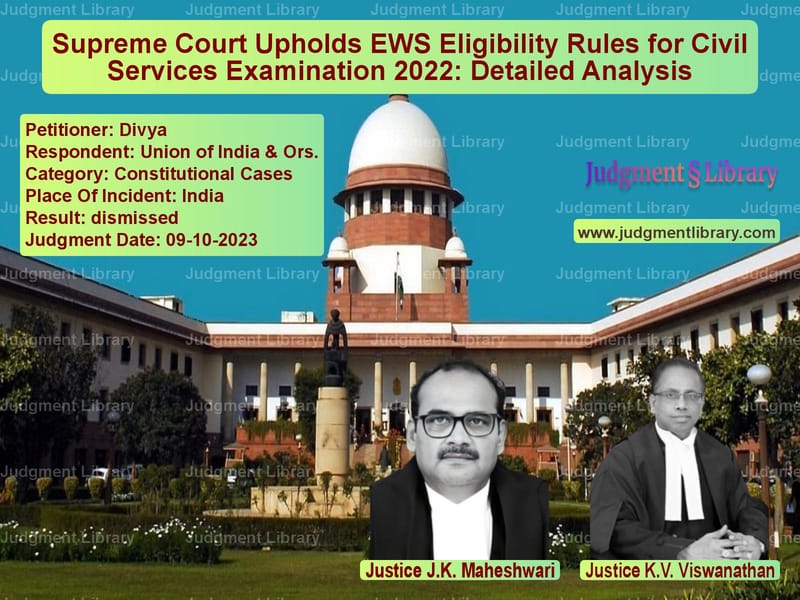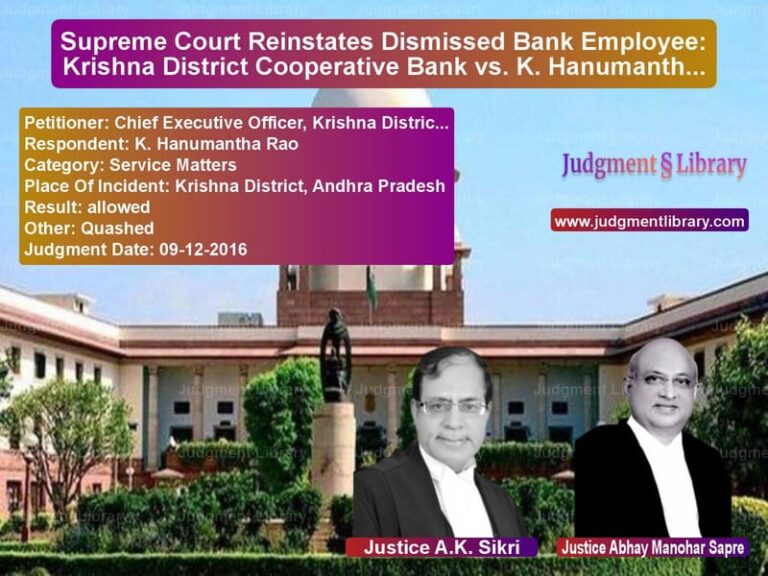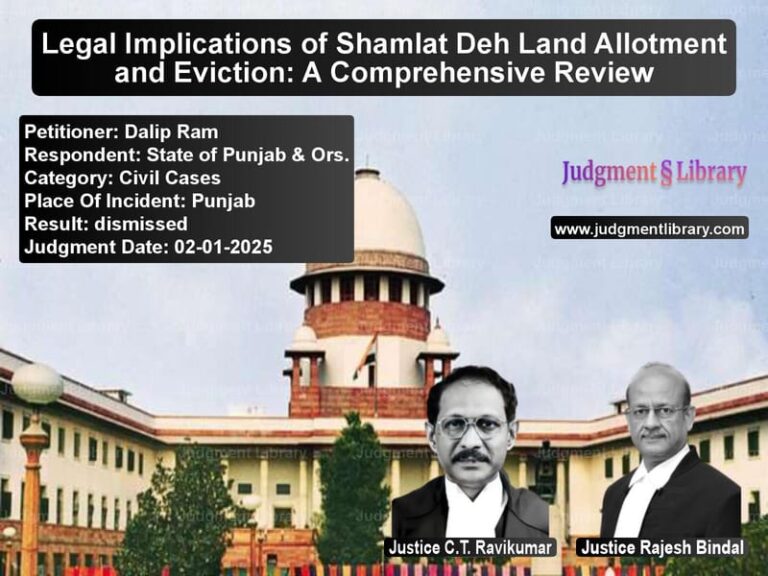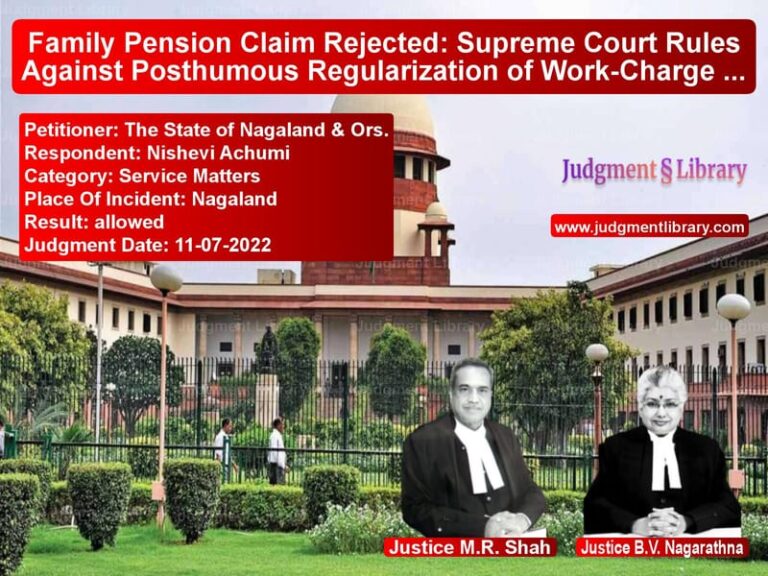Supreme Court Upholds EWS Eligibility Rules for Civil Services Examination 2022: Detailed Analysis
The Supreme Court’s decision in Divya vs. Union of India has reaffirmed the requirement for strict adherence to the rules governing the Economically Weaker Section (EWS) reservation in the Civil Services Examination (CSE) 2022. The Court upheld the validity of the Office Memoranda (OM) and CSE-2022 rules, emphasizing that candidates must possess a valid Income & Asset Certificate (I&AC) before the deadline to claim EWS reservation benefits. This judgment is crucial for future aspirants and sets a strong precedent for recruitment processes.
Background of the Case
The case revolved around multiple candidates, including Ms. Divya, who were denied the EWS reservation benefit in the Civil Services Examination 2022. The Union Public Service Commission (UPSC) rejected their claims because they failed to submit valid EWS certificates by the required deadline of 22.02.2022. The petitioners approached the Supreme Court, arguing that they should still be considered under the EWS category since their economic status met the eligibility criteria.
Arguments by the Petitioner – Divya
The petitioners put forward several arguments:
- Administrative delays: The petitioners contended that the delay in obtaining EWS certificates was beyond their control. They cited disruptions due to the COVID-19 pandemic, which allegedly caused delays in issuing certificates by local authorities.
- Substantial compliance: They argued that their economic status did not change, and since they later obtained the required certificates, they should not be disqualified for a procedural delay.
- Previous judicial precedents: The petitioners relied on past cases where courts allowed candidates to submit missing documents at a later stage. They claimed that similar leniency should be applied in their case.
- Violation of fundamental rights: The petitioners argued that rejecting their claims solely due to a delay in document submission violated Article 14 of the Constitution, which guarantees equality before the law.
Arguments by the Respondents – UPSC and Union of India
The respondents firmly defended the enforcement of the deadline:
- Strict rule adherence: The UPSC maintained that the rules clearly required candidates to possess and submit the I&AC before the prescribed date. Allowing exceptions would undermine the integrity of the selection process.
- Impact on other candidates: Granting relaxation to certain candidates would be unfair to those who complied with the rules and obtained their certificates on time.
- Administrative efficiency: The UPSC highlighted that recruitment processes must follow established deadlines to maintain fairness and efficiency. Allowing late submissions would set a precedent for future applicants to bypass deadlines.
- Precedents supporting strict cut-off dates: The respondents cited cases where courts upheld eligibility criteria and rejected late submissions, emphasizing that rules should not be altered mid-process.
Supreme Court’s Observations
The Supreme Court made several crucial observations:
- Eligibility vs. documentary proof: The Court distinguished between cases where candidates possessed the required qualification but lacked documentation and cases where eligibility itself was contingent upon possessing the certificate. Here, eligibility for EWS depended on having a valid I&AC before the deadline.
- Impact of late submissions: The Court emphasized that permitting post-deadline submissions would disrupt the recruitment process and create uncertainty.
- Consistency in rule enforcement: The Court held that deadlines were necessary to ensure uniformity and fairness in selection processes. Deviating from deadlines would erode trust in the system.
- Constitutional validity of the rules: The Court upheld Rules 13, 27(3), and 28 of CSE-2022 as legally valid and enforceable, rejecting the argument that they were arbitrary or unconstitutional.
Supreme Court’s Final Ruling
After thoroughly reviewing the arguments and legal precedents, the Supreme Court dismissed the petitions. It ruled that:
- The UPSC was justified in rejecting candidates who failed to meet the EWS documentation deadline.
- The CSE-2022 rules requiring timely submission of I&AC were constitutional and legally enforceable.
- Exceptions could not be made for individual candidates without disrupting the entire recruitment process.
- Administrative efficiency and fairness required strict adherence to deadlines.
Implications of the Judgment
The ruling has significant implications for future aspirants:
- Strict compliance with rules: Candidates must ensure that they possess and submit all required documents before the deadlines to avoid disqualification.
- Limited judicial intervention: Courts are unlikely to intervene in recruitment processes unless there is clear evidence of arbitrary action or procedural violations.
- Accountability of candidates: The judgment underscores the importance of candidates taking personal responsibility for fulfilling eligibility requirements on time.
Conclusion
The Supreme Court’s verdict in this case reinforces the principle that eligibility criteria and deadlines must be followed strictly in government recruitment processes. While the petitioners faced genuine difficulties, the Court emphasized that fairness requires consistent rule enforcement. This judgment serves as a crucial reminder for aspirants to adhere to procedural requirements and meet deadlines without relying on post-facto relaxations.
Petitioner Name: Divya.Respondent Name: Union of India & Ors..Judgment By: Justice J.K. Maheshwari, Justice K.V. Viswanathan.Place Of Incident: India.Judgment Date: 09-10-2023.
Don’t miss out on the full details! Download the complete judgment in PDF format below and gain valuable insights instantly!
Download Judgment: divya-vs-union-of-india-&-ors-supreme-court-of-india-judgment-dated-09-10-2023.pdf
Directly Download Judgment: Directly download this Judgment
See all petitions in Fundamental Rights
See all petitions in Constitution Interpretation
See all petitions in Public Interest Litigation
See all petitions in Judgment by J.K. Maheshwari
See all petitions in Judgment by K.V. Viswanathan
See all petitions in dismissed
See all petitions in supreme court of India judgments October 2023
See all petitions in 2023 judgments
See all posts in Constitutional Cases Category
See all allowed petitions in Constitutional Cases Category
See all Dismissed petitions in Constitutional Cases Category
See all partially allowed petitions in Constitutional Cases Category







